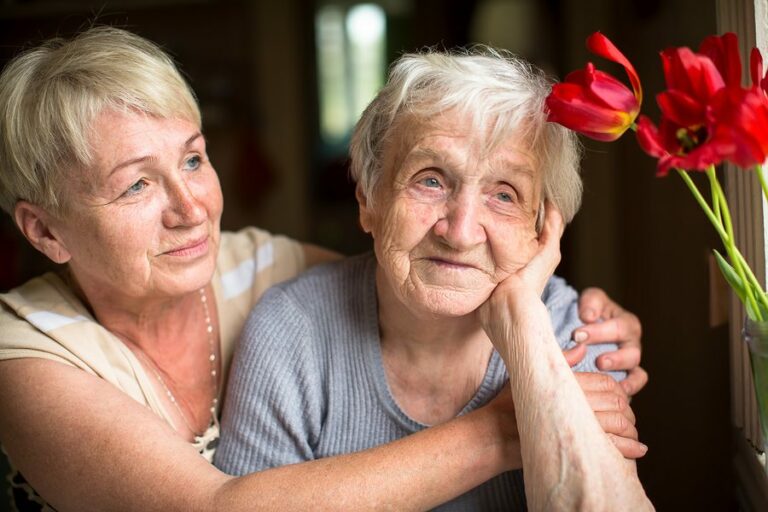
For people with Alzheimer’s disease (AD), communication becomes increasingly difficult as the disease progresses. When a person with AD reaches the middle to late stages of the disease, family caregivers and senior care providers may find verbal communication nearly impossible. However, that does not mean that you cannot communicate with a late-stage AD patient at all, it just means you need to change the way you do it. Non-verbal communication, commonly called body language, can be an effective method of “speaking” when AD takes away verbal abilities.
What is Body Language?
Every time you talk to someone you use body language. The way your hands move, the expression on your face, and even the way you stand communicate information to your audience. In fact, even when you’re not talking, your body is still communicating with those around you. For example, think about a time when you’ve known that someone was sad, angry, or tired just by looking at them.
Body language is important because it affects the way a person receives what you are saying. Body language indicates whether you care about a person or what they are saying, if you are being truthful, and if you are listening. Because body language is something we begin learning from the moment we are born, it is ingrained in us so that even people with late-stage AD still recognize the non-verbal messages they receive from senior care providers and family caregivers.
Tips for Using Body Language Effectively.
Using body language effectively with an AD patient involves not only being conscious of what your body is saying, but also being aware of the signals the patient is giving off. Pay attention to the person’s facial expressions and body movements. Watch for pained expressions or avoiding certain movements, which may communicate pain that the person cannot otherwise express. They may also point to what they want or use other gestures to communicate when words fail.
What a caregiver’s or senior care provider’s body says is also important in communicating with an AD patient. In fact, you can use body language to your advantage to provide the person with information about what you would like them to do. Here are some tips for using body language:
- Make sure that you are facing the person so that they can see your facial expression while you are speaking.
- Establish and maintain eye contact while you communicate so that the person knows you are paying attention to them and care about how they are feeling or what they are trying to say.
- Don’t stand too close to the person because it may feel intimidating or aggressive. Also, if the person is sitting, try not to stand over them while you’re communicating. Instead, drop down to their level so that you can look them in the eyes.
- Physical contact can be reassuring to someone with AD. Hold their hand or put an arm around them if it feels appropriate in the situation.
- Avoid making sudden movements. They may be upsetting to the person.
- Use gestures to communicate what you want the person to do. Mimic an action, such as brushing teeth or drinking from a cup. Likewise, encourage the person to use gestures to show you what they want.
It can take some time to get used to reading and using body language deliberately. Over time, it will become more natural. Keep practicing! Once you get the hang of it, body language can make a big difference in your ability to communicate with a person who has AD.
If you or an aging loved one are considering hiring senior care in Seneca, SC, contact Heart of the Carolinas Home Care at 864-991-3116. Providing Home Care Services in Greenville, Simpsonville, Greer, Anderson, Spartanburg, Mauldin, Seneca, Laurens, Charleston, Columbia and the surrounding areas.
Sources
https://www.alz.org/national/documents/brochure_communication.pdf
https://www.alzheimers.org.uk/info/20064/symptoms/90/communicating_and_language/3
http://www.dementiatoday.com/improving-your-nonverbal-communication-skills-and-reading-body-language/
- Home Care Assistance Helps Seniors After A Fall - April 9, 2025
- How Home Care Supports Seniors Who Are Hard of Hearing - March 28, 2025
- Why Seniors Should Consider Companion Care At Home - March 10, 2025

